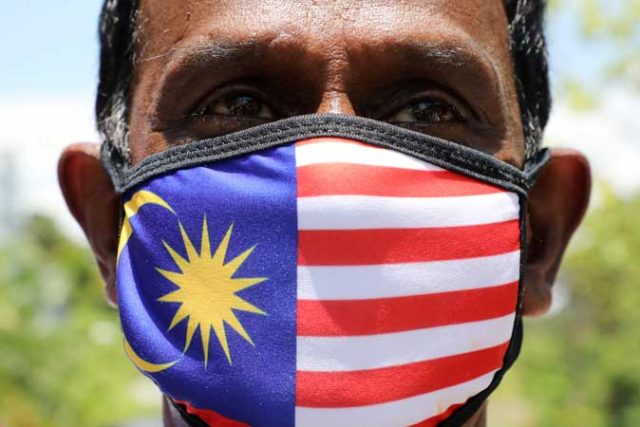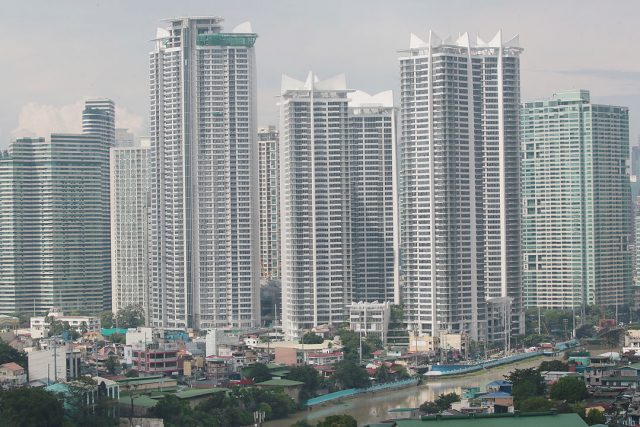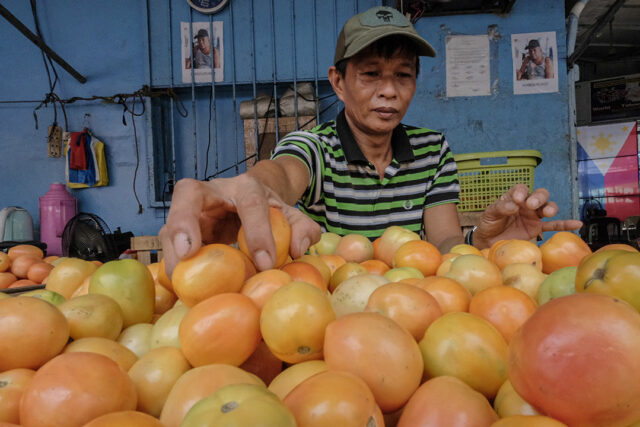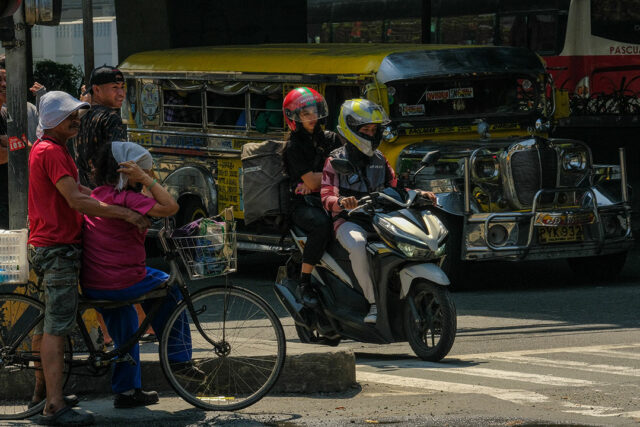By Luisa Maria Jacinta C. Jocson, Reporter
HEADLINE INFLATION remained steady in January as lower utility costs offset a spike in food prices, preliminary data from the Philippine Statistics Authority (PSA) showed.
The consumer price index (CPI) rose 2.9% year on year in January, the same as December. It also settled within the 2.5%-3.3% forecast from the Bangko Sentral ng Pilipinas (BSP).
The January print was also slightly higher than the 2.8% median estimate in a BusinessWorld poll of 16 analysts.

“The latest inflation outturn is consistent with the BSP’s assessment that inflation will remain anchored to the target range over the policy horizon,” the central bank said in a statement.
Core inflation, which discounts volatile prices of food and fuel, settled at 2.6% during the month — slower than 2.8% in December and 3.8% a year ago.
The heavily weighted food and nonalcoholic beverage index remained the top contributor to the overall CPI in January, accounting for a 50.3% share, National Statistician Claire Dennis S. Mapa said.
The index quickened to 3.8% in January from 3.4% a month earlier and 3.5% in the same period a year ago.
Food inflation alone accelerated to 4% from 3.5% in December and 3.3% in 2024.
Vegetables, tubers, plantains, cooking bananas and pulses soared to 21.1% in January from 14.2% in December and the 20.8% decline in the previous year.
In particular, tomato prices had a much faster annual growth rate of 155.7% from 120.8% a month earlier. This accounted for 0.4 percentage point (ppt) or 12.4% of January inflation.
Mr. Mapa said the increase in vegetable prices partly reflected the impact of typhoons.
Several storms hit the country in the fourth quarter, leading to billions of pesos worth of agricultural damage.
The increase in prices of meat and other parts of slaughtered land animals jumped to 6.4% from 4.9% month on month. Meat of pigs rose to 8.4% from 5.1%, while meat of poultry climbed to 8.4% from 7.7%.
Mr. Mapa said higher pork prices were due to cases of African Swine Fever (ASF) in some regions.
Data from the Bureau of Animal Industry showed some 88 municipalities across 19 provinces had active ASF cases.
Meanwhile, fish and other seafood also quickened to 3.3% from 1% a month prior.
RICE DOWNTREND
On the other hand, rice inflation contracted to 2.3% in January from the 0.8% clip in December and 22.6% jump a year prior.
This was also the lowest since the -2.8% rice inflation print in June 2020. It was also the first time that rice posted a contraction since the -0.1% in December 2021.
“Based on the current trend of prices, the expectation is that at least until July, we will expect negative inflation for rice,” Mr. Mapa added.
In January, the average price of regular milled rice declined to P48.25 per kilogram from P49.65 a year earlier. Well-milled rice decreased to P54.14 from P54.91, while special rice dropped to P63.13 from P63.90 year on year.
The Agriculture department on Monday declared a food security emergency on rice, which has remained stubbornly high despite the reduction of tariffs. The declaration will allow the National Food Authority to release buffer stocks at subsidized prices to help lower the cost of the staple grain.
“Any action to reduce the price of rice is always beneficial to our Filipino consumers, because rice has a heavy weight in our CPI basket,” Mr. Mapa said.
Meanwhile, the PSA said the housing, water, electricity, gas and other fuels index was also a main contributor to inflation, easing to 2.2% in January from 2.9% in December. However, it rose from the 0.7% print a year ago.
Manila Electric Co. lowered the overall rate by P0.2189 per kilowatt-hour (kWh) to P11.7428 per kWh in January from P11.9617 per kWh in December.
Data from the PSA showed inflation of rentals slowed to 2% from 2.4% in December, while water supply eased to 6.2% from 6.8%.
Water rates rose in January. Manila Water Co. raised rates by P5.95 per cubic meter, while Maynilad Water Services, Inc. hiked rates by P7.32 per cubic meter.
Transport inflation also slightly picked up to 1.1% from 0.9% in December and the 0.3% decline a year prior.
In January, pump price adjustments stood at a net increase of P2.65 a liter for gasoline, P4.80 a liter for diesel and P3.80 a liter for kerosene.
Data from the PSA showed inflation for the bottom 30% of income households eased to 2.4% in January from 2.5% a month prior and 3.6% in the previous year.
Consumer prices in the National Capital Region (NCR) eased to 2.8% in January from 3.1% in December. Outside NCR, inflation settled at 2.9%, the same as a month ago.
The central bank said inflation is likely to further ease in the coming months.
“The rice tariff reduction and negative base effects are expected to support disinflation,” it said.
However, the BSP noted risks to the inflation outlook continue to lean to the upside, citing “potential upward adjustments in transport fares and electricity rates.”
“The impact of lower import tariffs on rice remains as the main downside risk to inflation… However, uncertainty in the external environment could temper economic activity and market sentiment,” it added.
National Economic and Development Authority Secretary Arsenio M. Balisacan said the government is working to address food inflation as it remains “one of the government’s most pressing priorities.”
He said the government is implementing interventions to mitigate the impact of La Niña and ramping up vaccinations against ASF among other measures to help tame inflation.
DOWNSIDE RISKS
Meanwhile, HSBC economist for ASEAN Aris D. Dacanay said the risks to the inflation outlook are tilted to the downside, citing tariff cuts, the recent declaration of the food security emergency, as well as the implementation of a maximum suggested retail price for rice.
Analysts expect the Monetary Board to cut rates at its first policy review of the year next week.
Bank of the Philippine Islands Lead Economist Emilio S. Neri, Jr. said the possibility of a BSP rate cut on Feb. 13 has increased as inflation provides room for easing.
“Despite the slight upside surprise, we expect the BSP to continue loosening the monetary reins to help build support for domestic demand,” Mr. Dacanay said.
HSBC expects the Monetary Board to cut by 25 bps at the Feb. 13 meeting.
“Inflation is still within the lower-bound range of the BSP’s 2-4% target band, which gives the central bank room to maneuver and slightly shift its focus on growth,” Mr. Dacanay said.
The weaker-than-expected GDP data could also “push the central bank to prioritize growth,” Mr. Neri said.
The Philippine economy grew by a slower-than-expected 5.2% in the fourth quarter, bringing full-year 2024 growth to 5.6%. This fell short of the government’s 6-6.5% target.
Mr. Neri said the central bank will also likely consider the currency in its next policy decision.
“The peso may come under pressure if the Federal Reserve leaves interest rates unchanged for longer. The BSP appears to be open to USD/PHP moving higher as long as inflation remains within target,” he added.
However, Mr. Neri said further easing this year is unlikely to be aggressive.
“Nevertheless, we believe the scope for cuts this year remains limited. Aside from interest-differential driven portfolio outflow, the economy’s sizeable current account deficit makes the economy more vulnerable to intensifying external shocks i.e. global trade tensions.”
BSP Governor Eli M. Remolona, Jr. has signaled the possibility of 50 bps worth of rate cuts this year, citing that 75 bps or 100 bps may be “too much.”
This could be delivered in increments of 25 bps each in the first and second half of the year, he added.
However, the BSP chief has said that a rate cut is still on the table at the Feb. 13 meeting.
“Cutting the policy rate aggressively could amplify this vulnerability and exert unmanageable pressure on the peso. We therefore continue to expect a total of 50 bps in RRP rate cuts this year, which will bring the policy rate to 5.25% by yearend,” Mr. Neri added.
The central bank began its easing cycle in August last year, slashing borrowing costs by a total of 75 bps by end-2024. It delivered three straight rate cuts, bringing the benchmark to 5.75%.
REBASING
Meanwhile, the PSA said it is set to change the base year of price indices to 2023 from 2018 starting January 2026.
“We are looking at rebasing it to 2023 and the technical staff are already doing the preparatory work,” Mr. Mapa said.
“I think next year, not this year. We are doing rebasing for both the GDP and the inflation rate, both 2023,” he added.
The PSA periodically rebases the CPI to ensure that the CPI market basket captures goods and services commonly purchased by households over time, update expenditure patterns and synchronize its base year with that of GDP and other indices.
The rebasing is also in accordance with a PSA Board Resolution that approved the synchronized rebasing of price indices to base year 2006 and every six years thereafter
“Right now, what we’re doing is we’re looking at the commodity items from the last family income and expenditures survey. We may adjust the weights of commodity items,” Mr. Mapa said in mixed English and Filipino.
The PSA adjusts the weights of these items based on consumption, he added.
“Second, we also look at items that are new in 2023 versus 2018. There’s what we call a commodity and outlet survey, where we go to outlets to see where consumers buy typical commodities,” Mr. Mapa said.
“When you have an inflation report, there are some 500,000 items all over the country that the PSA collects. It takes substantial time to prepare and get all of this data,” he added.
The PSA approved the CPI rebasing to 2018 from 2012, which took effect in 2022.













